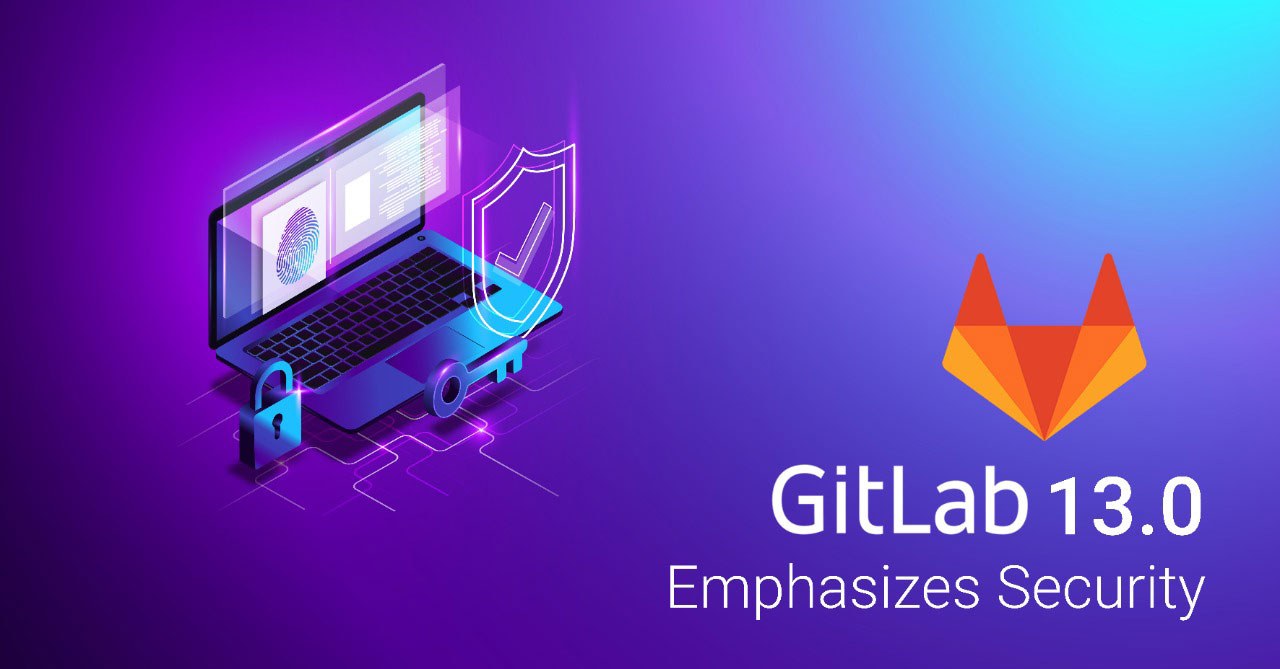GitLab 13.0 Emphasizes Security

Data Analyst
Experienced data analyst working with data visualization, cloud computing and ETL solutions.
July 18, 2020
Git is a control system that is beneficial to track alterations in computer files. The primary function of Git is to manage the alterations in multiple projects within a period. This helps to coordinate work within the team and tracks the progress of work. It helps professionals and non-technical users to monitor the project files. Git could manage projects of any size.
What is GitLab?
GitLab Company was one of the fast-progressing software companies in America in the year 2018. The company provides a core server facility that handles Git storehouses and thus eases out the administration concerns of companies across the globe. GitLab is a comprehensive DevOps platform that is delivered as a single application. This feature of GitLab facilitates the possibility of Concurrent DevOps and this makes it unique. This characteristic of GitLab helps you to unlock your company from the limitations of a single piece of a collection of segments of the toolchain. It provides great efficiency for a single application throughout the DevOps lifecycle.
GitLab Inc. maintains more than 3000 contributors being an open-source project. It helps teams to collaborate for software development. GitLab eliminates the complexity of toolchain and boosts the adoption of DevOps. It helps the companies to build applications that help them to manage administration tasks with a central and simplified server for all repositories. GitLab is a web-based project that caters to open and private repositories and has issue-following capabilities. Being a complete and comprehensive DevOps platform it allows professionals to conduct all the functions for a project, i.e. from planning and source code management to security and supervision. It also facilitates to collaborate and develop efficient software. GitLab aids the teams to minimize the product lifecycle and maximize the productivity to yield better value for customers. As it is a single server system, it doesn't demand the management of individual tools. Every member of the organization could access every component at any point in time. GitLab offers a single application that provides holistic services for software development and operation lifecycle. It facilitates the managing, planning, creating, verifying, packaging, releasing, configuring, monitoring, securing, and defending services required for the applications. The DevOps lifecycle of your application is scattered across numerous applications. These storehouses slow down the team by taking up integrating, configuring, and maintaining tasks. GitLab acts as a rescuer here by providing a single application to stimulate the speed and efficiency of workflow and software development. GitLab is easy to install and manage and provides long-term viability.
GitLab provides a Git-repository manager that provides a wiki, integration, deployment, and issue-tracking features using an open-source license maintained by GitLab Inc. Originally, the code was written in Ruby. It evolved into a comprehensive and integrated solution that covers the software development life cycle. The current technology stack of GitLab includes Ruby on Rails, Go, and Vue.js. It offers features to facilitate the DevOps lifecycle from planning to the monitoring process and offers replication, high availability, and scalability for using cloud storage.
Solutions provided by GitLab
GitLab provides services for facing the challenges by providing software development lifecycle. There are many solutions and services facilitated by GitLab. Let's have a look at some of the solutions of GitLab.
GitLab as a collaboration tool: GitLab collaborate efficiently to aid the better performance of professionals despite their location.
Flexible development: GitLab has agile software development features that help the team to fragment their work into smaller segments and thus boost effective software development.
Portfolio Management: GitLab enables portfolio management by planning, managing, and monitoring strategic epics and roadmaps.
Program Management: Programs spread across numerous products and groups could be managed by GitLab. It connects development teams with planning and managing project delivery.
Helps Stream Management: Value Stream Management (VSM) collects data from various software delivery pipelines and provides visibility. GitLab maximizes the value of the software factory by managing, visualizing, and measuring the business value.
Enable DevSecOps: GitLab enhances the quality and improves the security of the project by enabling security scans and testing for every pipeline and thus provides accurate feedback to the developers.
Supports enterprise business: GitLab is designed for easing organizing and maintaining processes. It can support and configure numerous users and requires minimum effort for managing administration. It implements backups, recovery, and high availability easily.
Accelerate delivery: GitLab enables high-speed software delivery. This feature of GitLab is crucial for the success of the business by reducing the cost and minimizing the effort of collaboration. The single application feature of GitLab helps the team to boost the delivery of software.
Cloud Transformation: GitLab enables cloud-native business applications.
Integrated APM: GitLab helps you to integrate the application with the DevOps lifecycle and aid to improve availability and performance.
Compliance and Governance: GitLab's workflows have built-in compliance natural and easy to deliver at the DevOps Velocity.
Tracks the Business Growth: the agile nature of GitLab helps you to scale the needs and requirements of the business.
Development Platform: GitLab enables the team to more productive by connecting, collaborating, and accelerating the delivery and thus helps to meet the business requirements.
History of progression since GitLab version 12.0
Requirements management, parent-child pipelines, and network security were the key features from version 12.0 of GitLab. Since then the company has enhanced the integration, security, and professional services.
GitLab enables IT and business companies to adapt, respond, and succeed. It helps to collaborate rapidly and automate processes to manage security and compliance. The new version of GitLab helps to iterate swiftly with greater focus. The Gitaly cluster has been enhanced for high availability Git storage.
GitLab 13.0

GitLab launched version 13.0 of its DevOps platform. This version connects tools for software development, organizing, and management. This latest version of GitLab has added new security and collaboration capabilities. GitLab unifies the control system, continuous delivery, and continuous integration, planning, and managing tools that are scattered across various platforms. The 13.0 version of GitLab was launched on May 22. This version of GitLab offers more security controls with the help of new features such as setting up a deployment freeze with Freeze Period API. This helps the team to prevent the unexpected production release within a specific period.
The GitLab version of 13.0 is available with support for Gitaly Clusters. The new feature to run Gitaly within a clustered configuration is accessible for users. This feature stimulates fault tolerance.
Features of GitLab 13.0
• The new addition for security scanning, SAST (Static Application Security Testing) for .NET framework. Whereas, DAST (dynamic application security testing) is provided for RSET APIs. The new version of GitLab offers support for running security scans for offline platforms.
• A new feature of Standalone Vulnerabilities restructures the management of vulnerabilities.
• Compliance management: facilitates users to establish the compliance framework, adopt regulatory controls, and simplify reporting. GitLab is coming up with a security policy UI to facilitate security guard rails.
• Design management: Design management is shifted to the core. This feature helps to recognize the users that design products as individual contributors.
• Customization feature of operations dashboard. Security dashboards are customizable for collaboration beyond users of GitLab.
• Gitaly Clusters are added to ensure that Git storehouse has replica to manage an outage. This feature becomes available with the GitLab version 13.0.
• Value Stream Management helps to identify waste and bottlenecks. In the new version, the Value Stream Analytics supports customization. This allows the organization to alter the features according to their unique workflow.
• Requirements management: the new version of GitLab, permits the professionals to develop and manage applications that cater to the specific business requirements of the user. This facilitates a flawless and smooth workflow, visibility, and compliance.
• Ensures completeness and tracking of projects to ensure the conformity. This helps the users to manage their software projects.
• The 13.0 version of GitLab permits to control of the cycle-time density of progressive delivery. It also enables the testing based on Feature Flags.
• The new version of GitLab has developed the existing capabilities that cater to collaboration, reporting, and organizing works via epics, milestones, and other features.
Security and compliance features of GitLab 13.0
• Standalone vulnerability: reconstructs the methods of managing vulnerabilities to release more strong future capabilities to facilitate users to highlight and maintain vulnerabilities and links associated with it.
• Responsible disclosure: GitLab users can demand CVE ID (common vulnerabilities and exposures) from GitLab. This request could be obtained directly from GitLab UI.
• Security scanning: 13.0 version of GitLab provides SAST for .NET framework. It also broadens the support for offline platforms. A complete history scan for secrets for enhanced detection.
• Container network security: MVC (minimal viable change) that facilitates the integration of cloud-native security solutions for container behavior offers visibility and security.
• Compliance management: This feature enables the users to mechanize the ability to launch a compliance framework. It also helps to adopt regulatory controls and to simplify assessment reporting.
• Secret management: GitLab develops primary integration services and security of secrets across the services.
GitLab mechanizes strategies and security scanning with 13.0 and provides more solid control with innovative and valid features.













